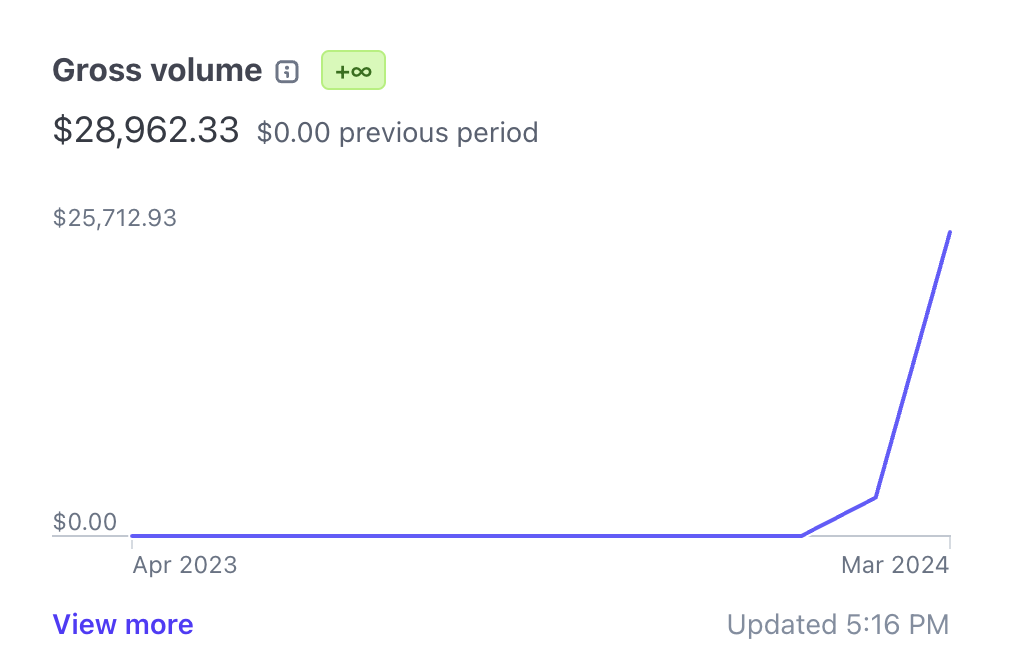|
|
What do your customers really value? - **Do they care about social impact,** transformation, function, or emotional gains? Identify your audience's existing values to increase revenue. - **To hit a subreddit's front page,** use a demo-first approach,
What do your customers really value?
-
Do they care about social impact, transformation, function, or emotional gains? Identify your audience's existing values to increase revenue.
-
To hit a subreddit's front page, use a demo-first approach, record your demo in light mode, and be very attentive to feedback.
-
$30K MRR after being banned. Jiayuan Zhang's product gained traction, then was banned in China. A quick pivot helped the company survive.
Want your product seen by over 85,000 founders and businesses? Sponsor an issue of the Indie Hackers newsletter. Choose between 3 affordable tiers that can fit almost any budget.
Non-Obvious Values That Customers Will Pay For 💰

by Julia Yu
What does “customer value” mean to you? You might think of money first, but is value truly equivalent to price, or do customers seek something else?
What customers really value
Research indicates that, for some purchases, the ability to enhance the buyer's reputation or reduce their anxiety plays a significant role.
Eric Almquist's 30 "Elements of Value" classifies consumer value elements into levels. Subjective and social values are at the top, and functional, more objective values are at the base. Let's consider a model suitable for both B2C and B2B, dividing the 30 universal elements into four groups:
- Social impact.
- Life-changing.
- Emotional.
- Functional.

The more, the better
Companies that score high on four or more elements show more stable revenue growth. According to the research, such companies demonstrate revenue growth four times higher than companies that have developed only one of the elements.
Successful founders understand what makes their product different from competitors and, over time, work on new elements to enter new markets. Typically, each new element attracts a new group of buyers, and increases the loyalty of existing customers.
However, it's not just the quantity; the significance of the elements matters. The emotional elements at the middle and top levels are harder to measure and assess, and more challenging to implement, but they deserve the most investment because they form brand value.
To determine which values to develop for your business, consider the industry, demographics, and cultural aspects.
Value hunting
You can continuously improve and add to the elements forming the core values by:
- Refining existing values:
First, identify the key elements most important to your industry. Are people looking for hope? An income increase? Risk reduction? Self-actualization? Ask yourself: How are these values reflected in the product and its marketing materials? How do competitors sell them?
2. Developing new values:
Choose all the values that are somewhat applicable to your business. Once you've identified a set of elements, brainstorm with your team to discuss ideas, and determine which elements to focus on first.
Pay special attention to values that are easy to develop, and can significantly impact the outcome. For example, take the value “access.” How can you increase access to the information your product unlocks? If you add this element, will it attract new customers?
3. Turning disadvantages into advantages:
Identify which of your offering's disadvantages can't be eliminated, and find values to outweigh them. For example, maybe you can't create an investor's community for your financial fortitude course. Instead, give the buyer the opportunity to feel like a finance expert by issuing a beautiful certificate upon completion of the training, tapping into the value of “belonging.”
More examples:
-
The shelf life of milk that spoils faster than its competitors can become an advantage when talking about healthy eating.
-
The inability to ensure factory quality and uniformity of products in a craft workshop can become valuable to a customer who values design aesthetics and individuality.
Final thoughts
Remember, the more a company focuses on social impact and inspiring elements, and continuously improves its value proposition, the higher its revenue and customer loyalty. Companies focused only on developing functionality and pricing lose in the competitive race.
Check out Unicorns Club for more on using this framework to highlight the values in your solution!
Discuss this story.
In the News 📰

Fresh Strategies for Hitting Reddit's Front Page 💡

by Nithur
I shared my project on r/OpenAI, and it got to the front page within 12 hours, with 100K views.
The common advice for launching on Reddit is to read the rules carefully and post in the right subreddit. This is all correct, but it's not enough. Here, I'm sharing unconventional tips for getting featured on the front page.
1. Always use a demo-first approach on Reddit
Don't just slap a link directly onto Reddit. Redditors don't like it, and won't care enough to click your link. Record a demo, create a relevant title, and post it.
Let it sit there until you receive 10 upvotes, then comment with the backstory of your product. Include a link in that comment.
2. Use light mode to record your demo
When people are using dark mode, a bright rectangular demo on their feed will instantly attract their attention. This is why many popular founders use a white background when sharing their writing on X.
This little trick can really make a difference. Try it the next time you post on Reddit.
3. Be attentive to feedback
People love to know that they are being heard. The mob mentality on Reddit means that, when people see that others are sharing positive feedback on your app, they will also be inclined to share good feedback and upvote your post.
Wrapping up
Try to follow this simple recipe when posting on Reddit next time. Of course, it is not a bulletproof strategy, but it deviates from the usual advice, meaning you won't be doing what everyone else is doing!
Discuss this story.
Top Posts on Indie Hackers This Week 🌐

The Power of Word-of-Mouth Marketing 🗣

by Jiayuan Zhang
While tools like ChatGPT can be helpful, they often generate code with errors or hallucinations. This is the problem I set out to solve with my startup, Devv, an AI-powered search engine built specifically for developers.
50 developer interviews
Before writing a single line of code, I wanted to deeply understand the needs and pain points of our target users. I conducted 1:1 Zoom interviews with 50 developers from various backgrounds, digging into their current challenges and the solutions they were using.
A common theme emerged: Developers were fed up with the inaccurate code snippets and explanations from generalist AI tools. They wanted a reliable, dev-focused alternative.
Building the solution
Armed with this key insight, we got to work building Devv. Under the hood, Devv is powered by RAG (Retrieval-Augmented Generation) and large language models. To ensure the most relevant and accurate results, we built our own specialized search indexes, spanning development-related websites, official documentation, and open source code repositories.
To validate our idea quickly, we challenged ourselves to build and launch an MVP within just one week. The initial version was bare bones, but functional. We shipped the MVP to a small group of friends and colleagues, and the feedback was overwhelmingly positive.
Differentiating
We made the decision to build our own custom search index specifically tailored to development-related scenarios. Rather than relying solely on general web results, Devv could draw upon a rich knowledge base of programming-specific information to answer questions and generate code snippets.
To further differentiate Devv, we implemented two other key features:
-
Agent Mode: For complex queries, Devv infers the user's intent, then selects from specialized agent types.
-
Clean, dev-focused UI: We designed Devv's interface to be clutter-free and intuitive.
Traction, then banned
We started by sharing Devv with my existing X following, which consisted mainly of developers based in China. Through word-of-mouth alone, Devv grew to 500K+ users within just a few months.
But just as we were hitting our stride, disaster struck. Devv was suddenly blocked by the Great Firewall, cutting off access for all of our users in mainland China. In an instant, our primary growth engine disappeared.
We went back to the drawing board, adapting Devv for a global audience. We started from scratch, rebuilding our user base one developer at a time. Slowly but surely, we began to gain traction in other markets.
In March, we launched a premium subscription plan, and hit $28K+ in revenue in the first month alone.

Advice for indie hackers
-
Solve a real, painful problem.
-
Validate quickly with an MVP.
-
Differentiate your offering.
-
Don't underestimate the power of word-of-mouth.
-
Adversity is inevitable. No startup journey is without its challenges. The key is to stay adaptable and keep pushing forward.
Discuss this story.
The Tweetmaster's Pick 🐦

by Tweetmaster Flex
I post the tweets indie hackers share the most. Here's today's pick:

Enjoy This Newsletter? 🏁
Forward it to a friend, and let them know they can subscribe here.
Also, you can submit a section for us to include in a future newsletter.
Special thanks to Jay Avery for editing this issue, to Gabriella Federico for the illustrations, and to Julia Yu, Darko, Nithur, and Jiayuan Zhang for contributing posts. —Channing
|
|
Indie Hackers | Stripe | 120 Westlake Avenue N, Seattle, Washington 98109
|
|
You're subscribed to the Indie Hackers Newsletter. Click here to unsubscribe.
|
|
|









